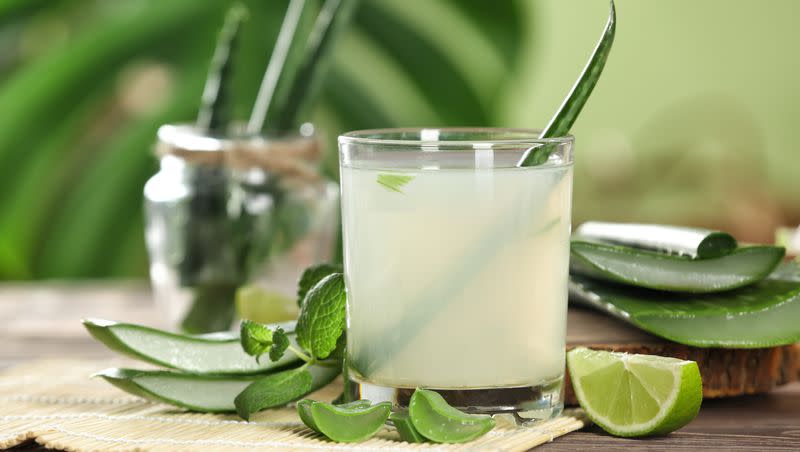Why are people drinking aloe vera juice? And is it good for you?

Many people know aloe vera for relieving sunburns and other minor burns. Growing up, my family would visit my aunt in Florida, and when returning from the beach, we would cut off stems from her aloe vera plants outside, peel the outer skin off, and use the slimy insides as a gel for our sun-kissed skin. But never once did I have the desire to eat it or put it in water and drink it.
Drinking aloe vera juice has become a trend on social media. On TikTok, the total number of video views has amassed to nearly 1.7 billion. One TikTok user claimed that drinking the plant juice regularly had improved her skin and gut health. In contrast, after taking it every morning for a while, another user said she didn’t notice much difference and would probably not continue with the trend.
So, is drinking aloe vera juice worth it?
Health benefits of aloe vera
Aloe vera has been used for thousands of years for its healing properties on the outside of our bodies, not the inside, per Health.
Some common ways aloe vera is used as a treatment include:
Sunburns.
Minor cuts.
Psoriasis.
Cold sores.
Hair loss.
Dandruff.
However, “Today, many people drink aloe vera juice to aid digestion, regulate blood sugar, improve oral health, and more. However, research supporting these benefits is limited, and ingesting aloe vera may have some potential side effects,” Health added.
What happens when you drink aloe vera?
Even though millions of people on TikTok are endorsing the tropical plant because their face has cleared up or they no longer feel bloated, science is more hesitant on coming to that conclusion.
Allure magazine wrote that board-certified dermatologist Barry Goldman “isn't too sure that drinking aloe juice will help placate acne. Dr. Goldman explains that he isn’t aware of any studies that explore the relationship between aloe vera juice and the skin, but he does think that ‘aloe vera juice may contain antioxidants and have anti-inflammatory (properties).’”
Goldman said, “There is no evidence that aloe vera juice benefits your skin more than drinking or eating other unsweetened, unprocessed juices, fruits, and vegetables. Most of the evidence is anecdotal, meaning that one or two people had a great experience or believe in it.”
When it comes to the advantages of aloe vera juice for digestive health, there is also a scarcity of research evidence.
GoodRx Health said there are health benefits to consuming aloe vera. Still, it emphasized that “Aloe vera juice isn’t an official treatment for the following conditions and may not even help with symptoms for some people. Always talk to your healthcare provider so they can determine the best treatments for you.”
Those benefits may include:
Promote better digestion.
Help with heartburn.
Beneficial for skin health.
Beneficial for diabetics.
Related
Aloe vera nutrition
Aloe vera juice contains a high concentration of antioxidants, which combat free radicals. This reduces stress in the body, thereby decreasing the likelihood of chronic diseases like diabetes, heart disease and cancer, according to WebMD.
Aloe vera juice is also rich in the following:
Vitamin A.
Vitamin C.
Vitamin E.
Beta-carotene.
Folic acid.
Calcium.
Magnesium.
